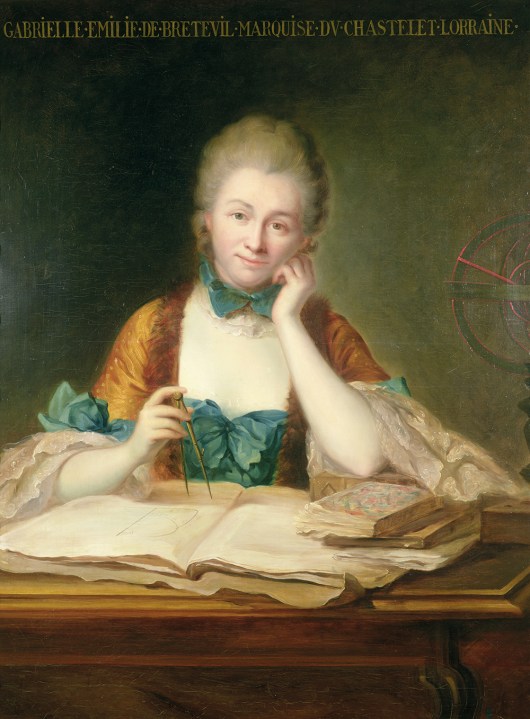
Two things that amaze me about the European Enlightenment are the brilliance of its achievements and the stupidity with which it excluded much of humanity from its circle. Say, for example, you were an 18th-century Frenchwoman who wished to advance human understanding of the universe by doing experiments, discussing texts and comparing hypotheses with other experts. You could forget about joining any of the scientific or philosophical academies created for that purpose – they would not let you in. Instead, your best hope was to create a salon and make it fashionable. For this you had to be wealthy, so you could provide the snacks and wine, and you’d need a country château or a Paris apartment or both. Also, you’d have to have been lucky enough in childhood to have a supportive parent to give you an education. Finally, you would need a tolerant husband – the sort who would not panic if he saw a scandalous personage such as Voltaire around the house.
All these advantages were possessed by one of the most celebrated of Enlightenment women, the Marquise du Châtelet. Born Gabriele Émilie le Tonnelier-de-Breteuil in Paris in 1706, she had an encouraging father who taught her Latin and Greek. She then had the suitable husband, Florent-Claude du Châtelet, an aristocratic colonel who owned the château of Cirey-sur-Blaise in the Champagne region, and who was often away on military service. Even when at home, he did not mind seeing Voltaire – which was fortunate, since Voltaire was at Cirey a lot and was Émilie du Châtelet’s lover for a time.
Mostly, the pair spent their days engrossed in the study of physics, especially the work of Isaac Newton. Du Châtelet translated Newton’s books and both she and Voltaire published their own studies of Newtonian theory. Of their two books, Du Châtelet’s The Institutions of Physics (1740) had more impact. It went into four editions and influenced Enlightenment thinkers ranging from the editors of the Encyclopédie (who reused her words with only partial acknowledgement) to Immanuel Kant, who praised her ‘distinction of understanding and scientific training’. Du Châtelet’s life was cut short at 42, when she died following childbirth, but her intellectual legacy lasted longer.
Not much longer, however. In subsequent years, she came to be thought of mainly as a translator and as Voltaire’s mistress, rather than as a serious philosopher of science. Kant, once so complimentary, now ridiculed her as a woman trying to apply her ‘lovely understanding’ to matters better left to men. Turned into a sidekick, she was kicked aside.
Voltaire described Newtonianism as
a ‘faith’, a ‘gospel’, and a cause for which one might become a ‘martyr’
So far, so familiar. Much restoration to her place in intellectual history has already been done, notably in a 2006 biography by Judith Zinsser, cited with appreciation here. In The Enlightenment’s Most Dangerous Woman, Janiak sets himself a different task. He seeks to show that Du Châtelet’s work was buried not only because she was female but because it contained philosophical elements that later generations found threatening.
Identifying these elements takes him deeply into her arguments in The Institutions, and thence into Newtonian physics, especially aspects found most controversial at the time, such as the theory of gravity as a universal force able to operate even in empty space. Some critics dismissed this as absurd: how can a force be transmitted if there is literally nothing to transmit it? Others embraced it so eagerly that they became almost religious in their devotion to the great man. Among these was Voltaire, who described Newtonianism as a ‘faith’, a ‘gospel’, and the sort of cause for which one might become a ‘martyr’.
Du Châtelet, by contrast, read the pro- and anti-Newton texts coolly, analysed their points and concluded that some right and wrong could be found in most of them. The edifice of science, she wrote, is built by many different hands. ‘Each philosopher has seen something, and none has seen everything; there is no book so bad that nothing can be learned from it, and none so good that one may not improve it.’ She warned the reader: ‘I advise you not to carry respect for the greatest men to the point of idolatry.’
Her message, as Janiak explicates it, is that we would do better to consider particular arguments as they are made rather than swearing allegiances. She also cautioned against getting carried away by abstract speculation. Hypotheses were a necessary speculative stage of scientific method, but they should be put forward with ‘epistemic modesty’, to use Janiak’s phrase. This meant recognising that complete truth about reality might never be found, but parts of it could be settled through scientific investigation tempered by good philosophical judgment, the two disciplines working not in competition (as often happened) but in harmony.
Kant ridiculed her as a woman trying to apply her lovely understanding to matters better left to men
Janiak argues that Du Châtelet’s philosophy ran up against the new era’s longing for heroes to worship, a desire that increased as Enlightenment thinkers became more emotionally invested in their projects. Rather than the many-builders picture, they wanted narratives in which modern geniuses and rebels (like themselves) overthrew older thinkers mired in tradition. The irony is that many of them in emulating their loner heroes became uncritically subservient to them. It’s all a bit Life of Brian: ‘Yes, we are all individuals!’
According to Janiak, Du Châtelet had to be sidelined because her philosophy of pluralism and restraint exposed their fallacies. Even the authors who benefitted most from her Newtonian interpretations went on to neutralise her by confining her to that interpretive role, ignoring her larger arguments. As a philosopher, she disappeared.
Janiak writes warmly about Du Châtelet’s work while mostly avoiding the hero-worship trap she had warned readers against. As co-leader of Project Vox, which recovers lost voices of women in science and philosophy, he has immersed himself in the subject for years, and tells us that the book emerged from a ‘thicket’ of material gathered by him and his research partner Karen Detlefsen, which they’re still ‘wading’ through. Meanwhile, he wanted to write a ‘popular book’ as an offshoot.
Some academic thorns remain. There are dense passages, and 75 pages of notes and bibliography is a lot for a 275-page book. The fact that ‘institutes’ then meant ‘foundations’ or ‘elements’ is explained too many times and not quite in the right places, and a few jovial remarks such as ‘things can get dicey’ are no substitute for genuine lightness of touch.
But it does not matter too much because the excitement comes from the argument rather than the story. This derives from Janiak’s feel for the forces that underlie how books fail or prosper in the world and for the way their authors are made to play various roles (hero, rebel, disciple, sidekick) as those forces pull them this way or that. He reminds us that the building, or revising, of a literary canon is also the work of many minds, and that those minds do not always operate in harmony. In providing us with a model for thinking about these processes, Du Châtelet the philosopher certainly deserves the reassessment she is now receiving.








Comments